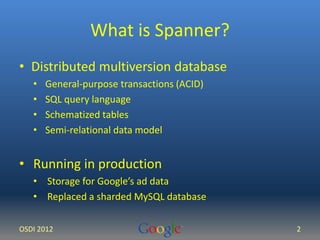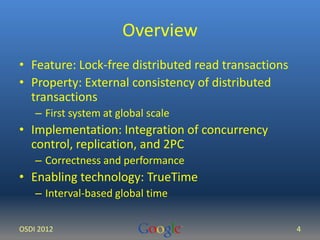Spanner is Google's globally distributed database that provides SQL queries and ACID transactions across datacenters. It uses TrueTime to assign timestamps based on a global clock with bounded uncertainty. This allows lock-free read transactions to retrieve a consistent view of data. Write transactions use two-phase locking and commit in timestamp order respecting the global clock to ensure external consistency.








![Version Management
• Transactions that write use strict 2PL
– Each transaction T is assigned a timestamp s
– Data written by T is timestamped with s
Time <8 8
[X]
[me]
15
[P]
My friends
My posts
X’s friends
[]
[]
OSDI 2012 9](https://image.slidesharecdn.com/spanner-osdi2012-141004110002-conversion-gate02/85/Spanner-osdi2012-9-320.jpg)







![Example
TC T2
TP
Remove X from
my friend list
Risky post P
s=8 s=15
Remove myself
from X’s friend list
sC=6
sP=8
s=8
Time <8
[X]
[me]
15
[P]
My friends
My posts
X’s friends
8
[]
[]
OSDI 2012 17](https://image.slidesharecdn.com/spanner-osdi2012-141004110002-conversion-gate02/85/Spanner-osdi2012-17-320.jpg)


![TrueTime Architecture
GPS
timemaster
GPS
timemaster
GPS
timemaster
Atomic-clock
timemaster
GPS
timemaster
GPS
timemaster
Client
Datacenter 1 Datacenter 2 … Datacenter n
Compute reference [earliest, latest] = now ± ε
OSDI 2012 20](https://image.slidesharecdn.com/spanner-osdi2012-141004110002-conversion-gate02/85/Spanner-osdi2012-20-320.jpg)






